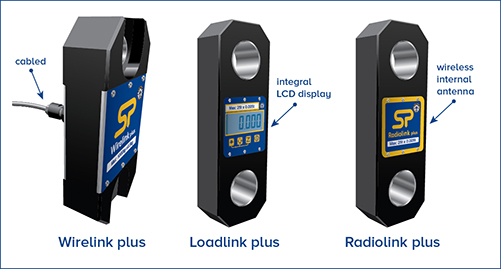Crosby Straightpoint’s (SP) world-renowned range of load links, used for load monitoring, is split into three distinct categories:
- Wireless tension load link (Radiolink plus) used with Crosby SP's wireless hand control or Bluetooth via iOS or Android device
- Cabled tension load link (digital dynamometer) with integral display (Loadlink plus)
- Cabled tension load link for use with an SP Handheld controller (Wirelink plus)
SP has designed their wireless load links to not include an integrated display and to include a separate non-wireless range that does.
Here are our reasons why:
1. The display tempts the operator to come closer to the dynamometer and the load to read it – this can compromise the operator’s safety by having them within a dangerous area around the lift. It is better to be at a safe distance away using the remotely connected handheld or smartphone with our Bluetooth apps installed.
2. The onboard display needs extra power to keep it running and so can kill the onboard battery life from 1200hrs to less than 100hrs. Generally, the display is the number one reason for repairs made on the load cell.
3. It is susceptible to damage from knocks from rough handling that can crack the screen or break parts of the internal componentry.
4. Working in hazardous areas, SP has developed the Radiolink plus into an intrinsically safe wireless load cell, with a range of 700m/2300m, ensuring safety at a distance
However, it is advantageous to use a Crosby SP cabled load link (also known as a digital dynamometer) that has an integral display during certain applications such as line tensioning or when the worker needs to be close-up to perform hands-on tasks/operations.
One good specific example would be using one with a tripod lifter where a worker uses a crank to lift the load. By its design the tripod lifter needs a close hands-on operation to use it, allowing the worker to be close enough to the load cell display to read it.




